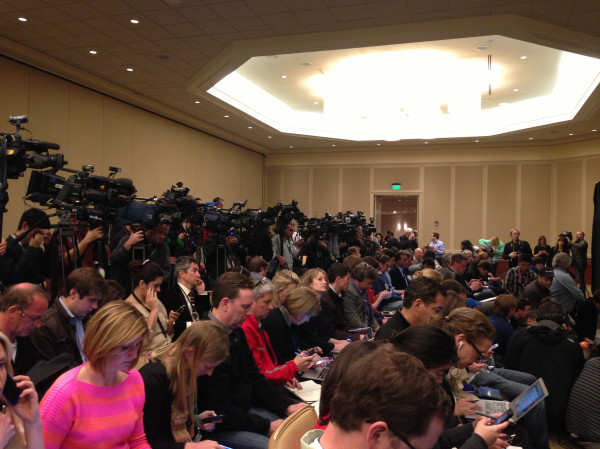Many people have spent yesterday questioning the manner in which the media prioritises life – and, in this instance, death – in the wake of the series of tragic events that took place on Tuesday.
As round-the-clock cable networks and nightly bulletins described the bombings in Boston as “heinous” and “an act of terror,” others were rightly pointing out that 55 people were reportedly killed in a separate incident in Iraq, and that the act that resulted in a substantially smaller loss of life received the majority of coverage.
After reports began emerging, much of the afternoon was spent by many criticising the coverage – or lack thereof – of the attacks.
A simple exercise in editorial judgment would attest to the events in Boston receiving the lion’s share of media coverage, as a result of the deaths there being deemed more important than those in the Middle East.
Which begs the question: are they?
From the perspective of a human being, clearly, they are not. If all life is equal, then the aforementioned 55 drastically outweigh the three.
It’s not even close.
Yet, from the position of someone in the media – I’ll leave it up to you to decide whether this person is still a human being or not – the three lives lost in Boston are of much greater significance.
Hear me out.
Speaking in regards to mainstream media organisations, the overall onus of that outlet is to generate funds. To increase cash-flow, cultivate assets, and whatever other financial jargon you want to add in.
The collective responsibility is not to produce the perfect, fair news broadcast, but rather to the shareholders.
The attacks in Boston, despite being less fatal, are almost unfathomably less common, meaning that they are – to put it bluntly – more shocking.
Ever heard the expression, “if it bleeds, it leads”?
If it bleeds in a major American city as a result of an “act of terror” it doesn’t just lead, it anchors your coverage for the next 48 hours.
Contrastingly, a deadly blast in Iraq is unfortunately so frequent, that it stopped warranting front-page coverage somewhere around 2008.
It’s the same reasoning that sees the Syrian conflict is oft swept under the proverbial carpet, and why a solo gang-related shooting in the US is sometimes not even mentioned at all.
With these commercial forces in mind, we then have to collectively question if it is right to sacrifice insight for profit.
It’s somewhat illogical and idealistic to hope for a media climate that doesn’t take into account commercial gains, but where do we draw the line?
Have we progressed beyond the point where news is the predominant vehicle for informing a society, and instead exists as a means of increasing profit?
To answer these questions, perhaps we need to examine the reader rather than the reporter.
Whether we care to admit it or not, we’re getting the news we want – for better or worse.
Never before has the audience had a greater control over the way news is shaped, and with this increased power, a proportional amount of responsible also has to be shouldered.
Think of it this way: how many times in the past month have you flicked past the World News pages, detailing the horrific deaths in Syria, in order to get to the Entertainment section?
Isn’t it hypocritical to rail against large-scale media outlets in the wake of such tragedy, when our options as an audience extend far beyond the ability of simply being able to change the channel.
This tweet from CNN was retweeted 2,910 times.
Two blasts at #Boston Marathon have injured at least 6 people,some seriously; situation still developing. http://t.co/rCfe7P4JyR
— CNN Breaking News (@cnnbrk) April 15, 2013
Mashable‘s breaking news tweet was shared 374 times.
BREAKING: 2 Explosions Occur at Boston Marathon http://t.co/owAxnBewU3
— Mashable (@mashable) April 15, 2013
That’s audience control.
We’re doing that; not the perma-criticised them.
By devoting more time to the attacks in Boston, media outlets are not decreeing that they are more important than those in other parts of the world, they’re mirroring our own hierarchy of significance.
In times like these, we are exposed to the ugly side of our own media appetites.
We may not like it, but it’s a situation that we played a significant role in creating.
 Liam Quinn is a third-year Bachelor of Journalism student at La Trobe University, and the editor of upstart. You can follow him on Twitter: @liamquinn23
Liam Quinn is a third-year Bachelor of Journalism student at La Trobe University, and the editor of upstart. You can follow him on Twitter: @liamquinn23







